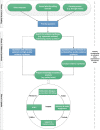Evidence synthesis to policy: development and implementation of an impact-oriented approach from the Eastern Mediterranean Region
- PMID: 37264415
- PMCID: PMC10234246
- DOI: 10.1186/s12961-023-00989-5
Evidence synthesis to policy: development and implementation of an impact-oriented approach from the Eastern Mediterranean Region
Abstract
Background: Despite the importance of evidence syntheses in informing policymaking, their production and use remain limited in the Eastern Mediterranean region (EMR). There is a lack of empirical research on approaches to promote and use policy-relevant evidence syntheses to inform policymaking processes in the EMR.
Objective: This study sought to describe the development of an impact-oriented approach to link evidence synthesis to policy, and its implementation through selected case studies in Lebanon, a middle-income country in the EMR.
Methods: This study followed a multifaceted and iterative process that included (i) a review of the literature, (ii) input from international experts in evidence synthesis and evidence-informed health policymaking, and (iii) application in a real-world setting (implementation). We describe four selected case studies of implementation. Surveys were used to assess policy briefs, deliberative dialogues, and post-dialogue activities. Additionally, Kingdon's stream theory was adopted to further explain how and why the selected policy issues rose to the decision agenda.
Results: The approach incorporates three interrelated phases: (1) priority setting, (2) evidence synthesis, and (3) uptake. Policy-relevant priorities are generated through formal priority setting exercises, direct requests by policymakers and stakeholders, or a focusing event. Identified priorities are translated into focused questions that can be addressed via evidence synthesis (phase 1). Next, a scoping of the literature is conducted to identify existing evidence syntheses addressing the question of interest. Unless the team identifies relevant, up-to-date and high-quality evidence syntheses, it proceeds to conducting SRs addressing the priority questions of interest (phase 2). Next, the team prepares knowledge translation products (e.g., policy briefs) for undertaking knowledge uptake activities, followed by monitoring and evaluation (phase 3). There are two prerequisites to the application of the approach: enhancing contextual awareness and capacity strengthening. The four case studies illustrate how evidence produced from the suites of activities was used to inform health policies and practices.
Conclusions: To our knowledge, this is the first study to describe both the development and implementation of an approach to link evidence synthesis to policy in the EMR. We believe the approach will be useful for researchers, knowledge translation platforms, governments, and funders seeking to promote evidence-informed policymaking and practice.
Keywords: Approach; Eastern Mediterranean Region; Evidence synthesis; Evidence-to-policy; Impact; Knowledge translation; Lebanon; Policy-relevant; Systematic review.
© 2023. The Author(s).
Conflict of interest statement
The authors declare that they have no competing interests in this section.
Figures
Similar articles
-
A multi-faceted approach to promote knowledge translation platforms in eastern Mediterranean countries: climate for evidence-informed policy.Health Res Policy Syst. 2012 May 6;10:15. doi: 10.1186/1478-4505-10-15. Health Res Policy Syst. 2012. PMID: 22559007 Free PMC article.
-
Use of health systems and policy research evidence in the health policymaking in eastern Mediterranean countries: views and practices of researchers.Implement Sci. 2012 Jan 11;7:2. doi: 10.1186/1748-5908-7-2. Implement Sci. 2012. PMID: 22236561 Free PMC article.
-
Systematic reviews addressing identified health policy priorities in Eastern Mediterranean countries: a situational analysis.Health Res Policy Syst. 2014 Aug 20;12:48. doi: 10.1186/1478-4505-12-48. Health Res Policy Syst. 2014. PMID: 25139256 Free PMC article.
-
How contexts and issues influence the use of policy-relevant research syntheses: a critical interpretive synthesis.Milbank Q. 2013 Sep;91(3):604-48. doi: 10.1111/1468-0009.12026. Milbank Q. 2013. PMID: 24028700 Free PMC article. Review.
-
Embedding rapid reviews in health policy and systems decision-making: Impacts and lessons learned from four low- and middle-income countries.Health Res Policy Syst. 2023 Jun 6;21(1):45. doi: 10.1186/s12961-023-00992-w. Health Res Policy Syst. 2023. PMID: 37280697 Free PMC article. Review.
Cited by
-
Analysis of funding landscape for health policy and systems research in the Eastern Mediterranean Region: A scoping review of the literature over the past decade.Health Res Policy Syst. 2024 Jun 24;22(1):70. doi: 10.1186/s12961-024-01161-3. Health Res Policy Syst. 2024. PMID: 38915031 Free PMC article.
-
Environmental Scanning Model in Health System and Implementation Steps: A Scoping Review.Iran J Public Health. 2024 Jun;53(6):1261-1271. Iran J Public Health. 2024. PMID: 39430162 Free PMC article.
-
Evidence Synthesis for the Development of National Nursing-Sensitive Indicators in Malaysia: A Literature Review and Stakeholder Engagement Approach.SAGE Open Nurs. 2024 Oct 14;10:23779608241286426. doi: 10.1177/23779608241286426. eCollection 2024 Jan-Dec. SAGE Open Nurs. 2024. PMID: 39421600 Free PMC article. Review.
References
-
- World Health Organization. Evidence-informed decision-making for health policy and programmes: insights and best practices from successful country initiatives. 2021.
-
- Chhetri DZF. Advocacy for evidence-based policy-making in public health: experiences and the way forward. J Health Manag. 2021;23(1):85–94. doi: 10.1177/0972063421994948. - DOI
Publication types
MeSH terms
LinkOut - more resources
Full Text Sources



